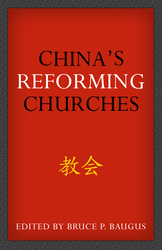China’s Reforming Churches, Bruce P. Baugus. ed., Grand Rapids, MI, Reformation Heritage Books, 2014, 320 pages. ISBN-10: 1601783175; ISBN-13: 978-1601783172; Paperback $17.98 at Amazon.
Reviewed by Jennifer Guo
For Christians with a passion for missions, China is on center stage. We certainly recognize this strategic mission field of approximately 1.35 billion people, and tremendous evangelistic fruit is being seen as a staggering number are becoming Christian daily. While fervent evangelistic efforts surely need to continue, especially since many of China’s minority groups are considered unreached/unengaged, the astounding growth rate of the church poses critical and urgent needs in relation to church development. In this area, China’s Reforming Churches is a unique book in that it focuses more on ecclesiology than missiology, more on building up the church than on evangelism (though of course these are connected). “Indeed, the proper goal of the church’s mission has never been just to announce the good news to those who have not heard or to call unbelievers to faith and repentance; the church’s mission also includes establishing a well-ordered church in every land for the welfare of God’s people and perpetuation of the ministry” (17).
More specifically, the particular ecclesiology espoused in this book is the presbyterian*/ Reformed variety. China’s Reforming Churches is written from the conviction that the need for church development in China is largely the need for the development of a healthy and robust presbyterianism through an understanding of a biblical theology of the church as articulated within the Reformed tradition. As such, this book has a narrow focus and target audience. I have read some reviews criticizing this narrow focus and asserting that this book would be more helpful and have a wider audience if it were not written from this perspective; however, the focus and perspective were intentional and therefore cannot legitimately be criticized. This narrow focus is actually what drew me to this book; general books about mission work in China abound, but I am not aware of any other book that looks at the reformation that is going on in China. In fact, I did not even know that such a reformation was underway!
Reformed theology is being disseminated and embraced throughout China; Reformed confessions of faith are being translated or written and adopted; new attention is being paid to worship, preaching, and leadership; local congregations, and in a few cases entire networks, are being organized or reorganized along presbyterian lines; Reformed seminaries are being established throughout the country; a Chinese presbyterian polity has been drawn up; presbyteries are being formed in various places and are in communication with one another; ministers are being trained, examined, and ordained; and the great works of the Reformed tradition are being brought into open circulation. All of this is just the beginning of an attempt by Chinese pastors and church leaders to meet the needs of God’s people and lay a firm foundation for the future. Despite their vigorous efforts, every one of them “would agree that the church is struggling to keep up with the demand for trained leaders and other resources” as the gospel continues to spread and grow in the world’s largest mission field (Baugus 22-23).
The above quote is likely to shatter many people’s conception of Christianity in China. Typically the Church in China is primarily thought of as a persecuted church where non-registered house churches have no freedom to congregate and practice their faith, and where unthinkable physical persecution is the norm and not the exception. Therefore, presbyterianism (or any highly formalized training or organization, for that matter) is often not thought of as possible in China. However, China’s Reforming Churches frequently corrects common erroneous presuppositions and reveals that within China there is a surprising amount of freedom for Christians and even for the officially illegal, unregistered churches. It is an entirely different story when foreigners are involved, and the book goes into more detail about that.
China’s Reforming Churches is an excellent survey of presbyterianism in China—from its history (part 1), to the current landscape (part 2), to current challenges and opportunities (part 3), and to how China’s reforming churches are appropriating the Reformed tradition in their context (part 4). Birthed out of a conference of Presbyterian and Reformed Christians interested in presbyterianism in China, the content in this book is from a combination of fine American scholars and Chinese reforming pastors. China’s Reforming Churches provides much valuable insight into China in general, as well as what God is doing there in a general sense. With the awareness that this book is from a presbyterian perspective, any Christian with an interest in the church in China would benefit from this book, though non-presbyterians will disagree with its fundamental driving conviction. However, those who identify with the Reformed tradition in any way would find this book most enjoyable, beneficial, and encouraging. China’s Reforming Churches is essential reading on missions and ecclesiology in China from the Reformed perspective.
* Presbyterianism is written with a lowercase “p” in this review because of the distinction made in the book between the simple institutional form of church outlined in Scripture and particular Presbyterian traditions/denominations (indicated by capital “P”) that apply the basic principles of presbyterianism.
This review appeared in an earlier version on Jennifer Guo’s blog at https://jenniferguo.wordpress.com/2014/07/06/book-review-chinas-reforming-churches-mission-polity-and-ministry-in-the-next-christendom/ and is used with permission.
Image courtesy of Reading by Jean-Etienne Minh-Duy Poirrier, on Flickr.

Jennifer Guo
Jennifer Guo, M.S., is a Chinese-American professional who will be starting a Master of Divinity degree at Trinity Evangelical Divinity School this fall. You can follow her on Twitter @jenniferguo and check out her personal blog at jenniferguo.wordpress.com. View Full Bio
